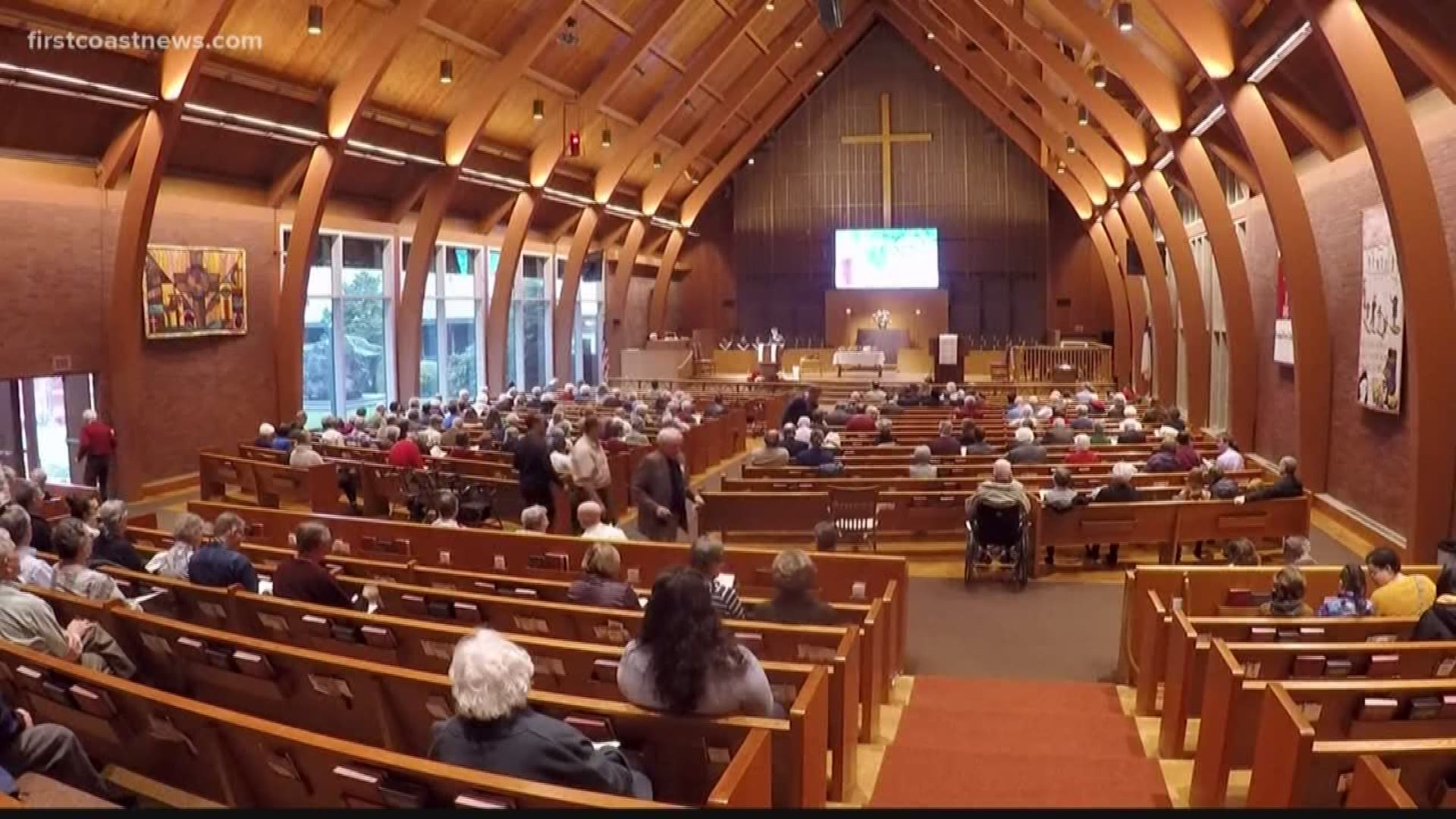JACKSONVILLE, Fla. — It’s a worldwide split that would have local consequences. Exactly what those consequences would be, however, isn't clear yet.
The United Methodist Church appears on the verge of schism. Northeast Florida District Superintendent Jay Therrell says it’s all because of disagreements about performing same-sex marriages and allowing LGBTQ clergy. The debate, he says, has festered since the UMC added language to its Book of Discipline – essentially the church’s lawbook – banning those practices.
But, after the church announced a proposal earlier this month, signed by 16 leaders worldwide, Therrell says the issue has come to a head.
“This feels like it has enough weight behind it that something will happen,” he told First Coast News on Tuesday.
“About four years ago, it really began to look where the church was getting into an untenable place,” he said.
It was in 2016 that the church elected its first openly gay bishop, Karen Oliveto, in the western United States. But Therrell said the debate is nothing new and the church might be at this point anyway.
“Whether Bishop Oliveto was elected or not, I think the other civil disobedience probably would have gotten us to this point as well,” he said, referring to many local churches flouting the Book of Discipline by performing same-sex weddings and ordaining LGBTQ clergy members.
As the UMC prepares for an official vote this May at its international conference in Minnesota, a conference held every four years, Therrell explains that the schism sentiment is coming largely from conservative regions where the church is growing quickly outside the United States, such as Africa and the Philippines.
The anticipated schism would actually see the more liberal faction – so-called Progressives - keeping the United Methodist Church name; the Traditionalists – those adhering to the Book of Discipline – would splinter off and form one or more different denominations.
Although he hesitated to guess how many of the 65 churches he oversees would favor schism, Therrell emphasized that he doesn’t observe homophobia among the more conservative Methodists he knows in northeast Florida.
“I don’t know a single Traditionalist that doesn’t love every LGBT person they know,” Therrell said.
Although the details of an agreement to split are yet to be determined, Therrell explained that individual church properties are subject to trust that reverts ownership back to the church. However, he said, that arrangement would likely be abandoned.
“This plan for separation states that the trust clauses would be released, and if churches decide to leave, they could take their property with them,” he said, contending that such a plan would help the UMC sidestep the kind of costly lawsuits that have drained other churches at times of division.
“Sometimes things are hard to talk about, and you hate to think of it as a schism,” said Carol Godwin, who has attended worship at the First United Methodist Church in St. Augustine for about 20 years. She paused during choir practice Tuesday to talk with First Coast News.
“We’re dealing with a worldwide denomination,” Godwin observed, “and it’s not necessarily what we might think in America, or in Florida, or even in this church.”
Her place of worship has been the site of discord and civil rights battles: in the 1960s African-Americans were not only banned, some were even arrested for trying to attend services there. Flash-forward to 2018, when the First United Methodist Church in St. Augustine installed its first African-American pastor, Juana Jordan, who also happened to be the first female to take the position there.
But while they face what they believe is inevitable separation, neither Therrell nor Godwin seemed entirely vexed.
“There are a lot of other things in the world that I’m a lot more concerned about,” Godwin chimed, saying she expects to stay the course right where she’s been for two decades regardless of what her individual church decides to do.
Both even emphasized hope bordering on the expectation that the church can continue its mission.
“We may not be able to work together in all places,” Godwin acknowledged, “but on issues that we can work together, we can continue missions, continue ministries.”
“My hope is, if all of this comes to pass, is that we will be able to bless each other, separate, and still link arms on important things,” Therrell affirmed. “My Baptist friends and I typically don’t agree on every point of theology,” he continued. “But because we’ve separated, we don’t have to argue about that. We can still link arms and go feed hungry people.”
Therrell said he’s asked worshipers to do three things: pray, be a non-anxious presence, and keep their focus on the mission of spreading the gospel.
“I think evil wins if our eyes get pulled off of that mission because of denominational drama,” he warned. “There are still hurting people in our communities who don’t know Jesus, and our job is to make disciples of Jesus for the transformation of the world.”
“I’m called to be a follower of Jesus first, and so that doesn’t stop,” Therrell said. “I know how the Bible ends. I know how the story ends: God wins,” he declared.
“So I’m an optimist,” he said.

